University IFM Report: Brexit's Impact on Global Finance
VerifiedAdded on 2021/12/06
|7
|1153
|76
Report
AI Summary
This report delves into the impact of Brexit on international financial management, analyzing the consequences of the UK's decision to leave the European Union. It examines currency devaluation, its effects on the British pound, and the resulting changes in import and export dynamics. The report further explores the influence of Brexit on foreign direct investment (FDI), both inward and outward, and its effects on the UK's economic landscape. The analysis includes a review of spot exchange rate fluctuations and their impact on various sectors, such as the car industry and financial services. The report also provides a comparative analysis of global FDI trends, highlighting the shifts in investment flows across different regions and countries, including the UK, Singapore, and the Netherlands. The findings are supported by figures and references to relevant economic literature, offering a comprehensive overview of Brexit's implications on international finance.
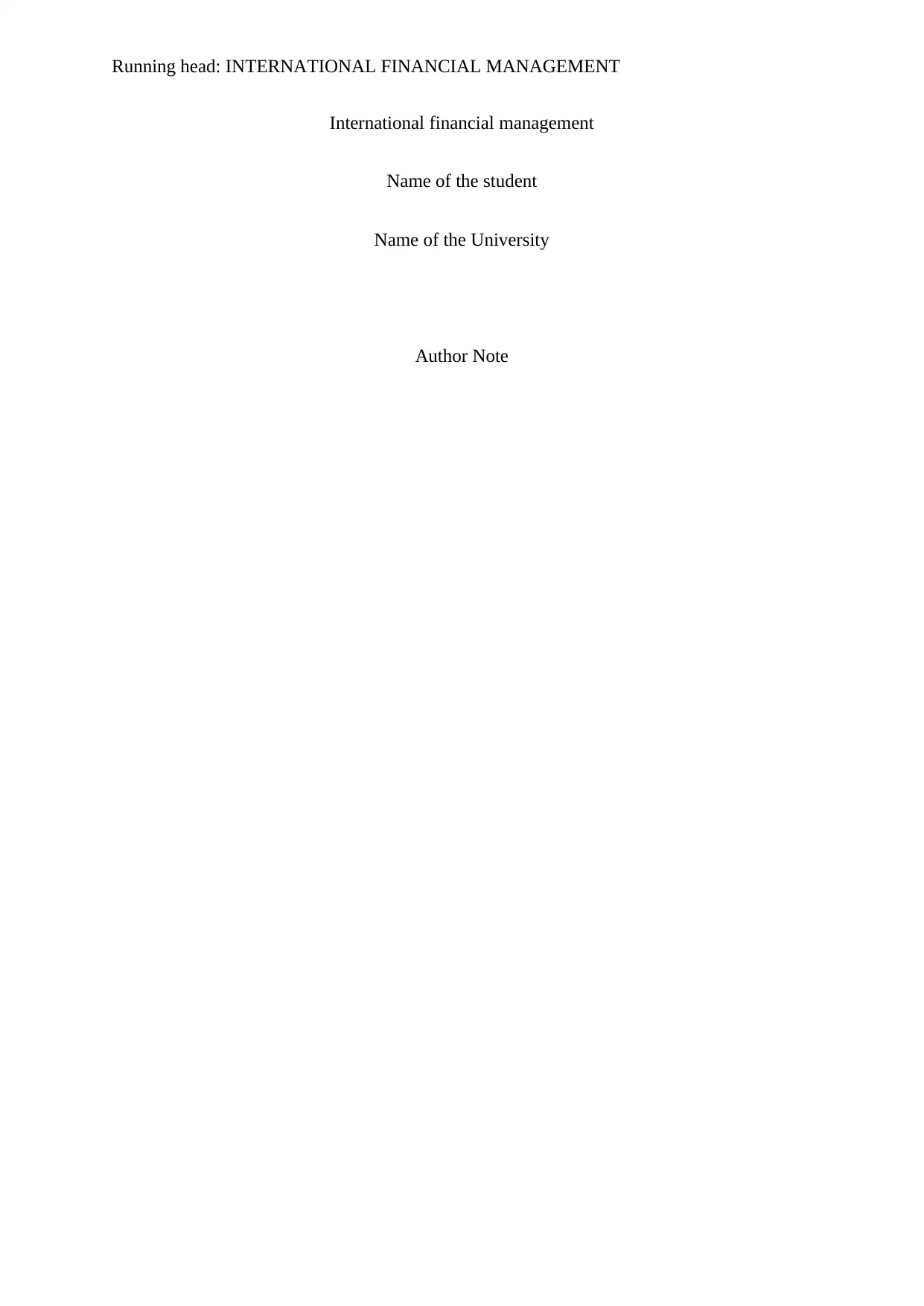
Running head: INTERNATIONAL FINANCIAL MANAGEMENT
International financial management
Name of the student
Name of the University
Author Note
International financial management
Name of the student
Name of the University
Author Note
Paraphrase This Document
Need a fresh take? Get an instant paraphrase of this document with our AI Paraphraser
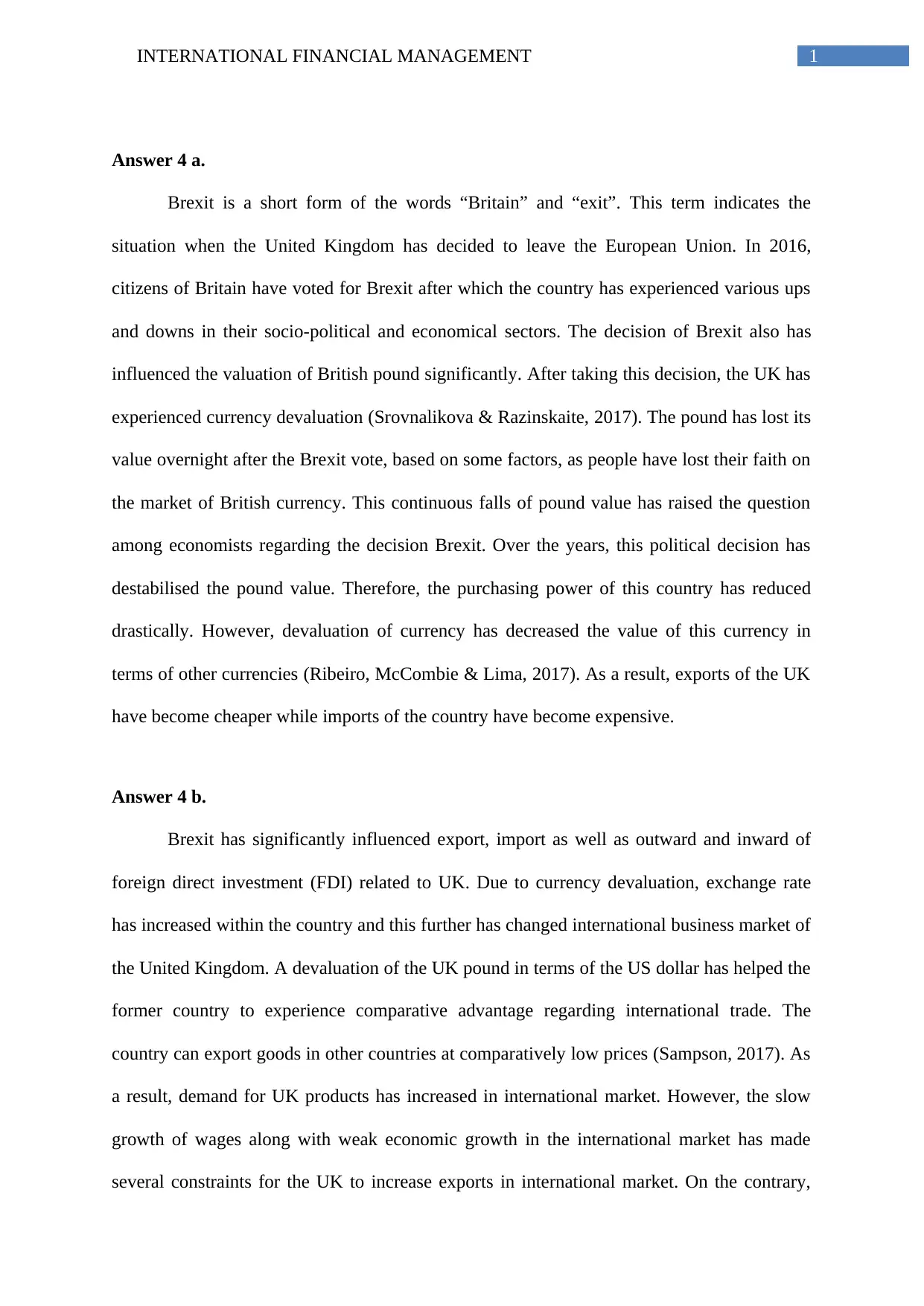
1INTERNATIONAL FINANCIAL MANAGEMENT
Answer 4 a.
Brexit is a short form of the words “Britain” and “exit”. This term indicates the
situation when the United Kingdom has decided to leave the European Union. In 2016,
citizens of Britain have voted for Brexit after which the country has experienced various ups
and downs in their socio-political and economical sectors. The decision of Brexit also has
influenced the valuation of British pound significantly. After taking this decision, the UK has
experienced currency devaluation (Srovnalikova & Razinskaite, 2017). The pound has lost its
value overnight after the Brexit vote, based on some factors, as people have lost their faith on
the market of British currency. This continuous falls of pound value has raised the question
among economists regarding the decision Brexit. Over the years, this political decision has
destabilised the pound value. Therefore, the purchasing power of this country has reduced
drastically. However, devaluation of currency has decreased the value of this currency in
terms of other currencies (Ribeiro, McCombie & Lima, 2017). As a result, exports of the UK
have become cheaper while imports of the country have become expensive.
Answer 4 b.
Brexit has significantly influenced export, import as well as outward and inward of
foreign direct investment (FDI) related to UK. Due to currency devaluation, exchange rate
has increased within the country and this further has changed international business market of
the United Kingdom. A devaluation of the UK pound in terms of the US dollar has helped the
former country to experience comparative advantage regarding international trade. The
country can export goods in other countries at comparatively low prices (Sampson, 2017). As
a result, demand for UK products has increased in international market. However, the slow
growth of wages along with weak economic growth in the international market has made
several constraints for the UK to increase exports in international market. On the contrary,
Answer 4 a.
Brexit is a short form of the words “Britain” and “exit”. This term indicates the
situation when the United Kingdom has decided to leave the European Union. In 2016,
citizens of Britain have voted for Brexit after which the country has experienced various ups
and downs in their socio-political and economical sectors. The decision of Brexit also has
influenced the valuation of British pound significantly. After taking this decision, the UK has
experienced currency devaluation (Srovnalikova & Razinskaite, 2017). The pound has lost its
value overnight after the Brexit vote, based on some factors, as people have lost their faith on
the market of British currency. This continuous falls of pound value has raised the question
among economists regarding the decision Brexit. Over the years, this political decision has
destabilised the pound value. Therefore, the purchasing power of this country has reduced
drastically. However, devaluation of currency has decreased the value of this currency in
terms of other currencies (Ribeiro, McCombie & Lima, 2017). As a result, exports of the UK
have become cheaper while imports of the country have become expensive.
Answer 4 b.
Brexit has significantly influenced export, import as well as outward and inward of
foreign direct investment (FDI) related to UK. Due to currency devaluation, exchange rate
has increased within the country and this further has changed international business market of
the United Kingdom. A devaluation of the UK pound in terms of the US dollar has helped the
former country to experience comparative advantage regarding international trade. The
country can export goods in other countries at comparatively low prices (Sampson, 2017). As
a result, demand for UK products has increased in international market. However, the slow
growth of wages along with weak economic growth in the international market has made
several constraints for the UK to increase exports in international market. On the contrary,
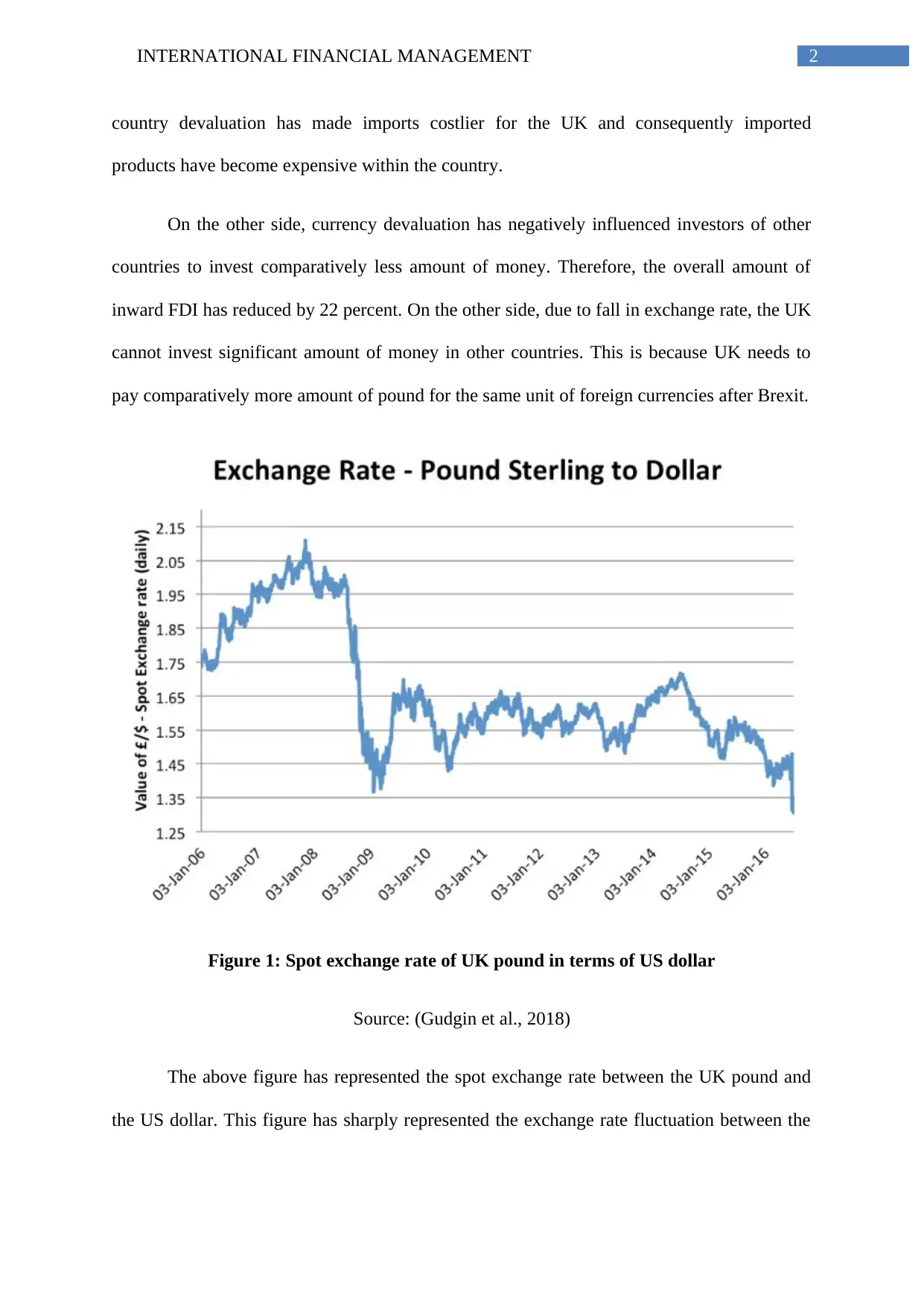
2INTERNATIONAL FINANCIAL MANAGEMENT
country devaluation has made imports costlier for the UK and consequently imported
products have become expensive within the country.
On the other side, currency devaluation has negatively influenced investors of other
countries to invest comparatively less amount of money. Therefore, the overall amount of
inward FDI has reduced by 22 percent. On the other side, due to fall in exchange rate, the UK
cannot invest significant amount of money in other countries. This is because UK needs to
pay comparatively more amount of pound for the same unit of foreign currencies after Brexit.
Figure 1: Spot exchange rate of UK pound in terms of US dollar
Source: (Gudgin et al., 2018)
The above figure has represented the spot exchange rate between the UK pound and
the US dollar. This figure has sharply represented the exchange rate fluctuation between the
country devaluation has made imports costlier for the UK and consequently imported
products have become expensive within the country.
On the other side, currency devaluation has negatively influenced investors of other
countries to invest comparatively less amount of money. Therefore, the overall amount of
inward FDI has reduced by 22 percent. On the other side, due to fall in exchange rate, the UK
cannot invest significant amount of money in other countries. This is because UK needs to
pay comparatively more amount of pound for the same unit of foreign currencies after Brexit.
Figure 1: Spot exchange rate of UK pound in terms of US dollar
Source: (Gudgin et al., 2018)
The above figure has represented the spot exchange rate between the UK pound and
the US dollar. This figure has sharply represented the exchange rate fluctuation between the
⊘ This is a preview!⊘
Do you want full access?
Subscribe today to unlock all pages.

Trusted by 1+ million students worldwide
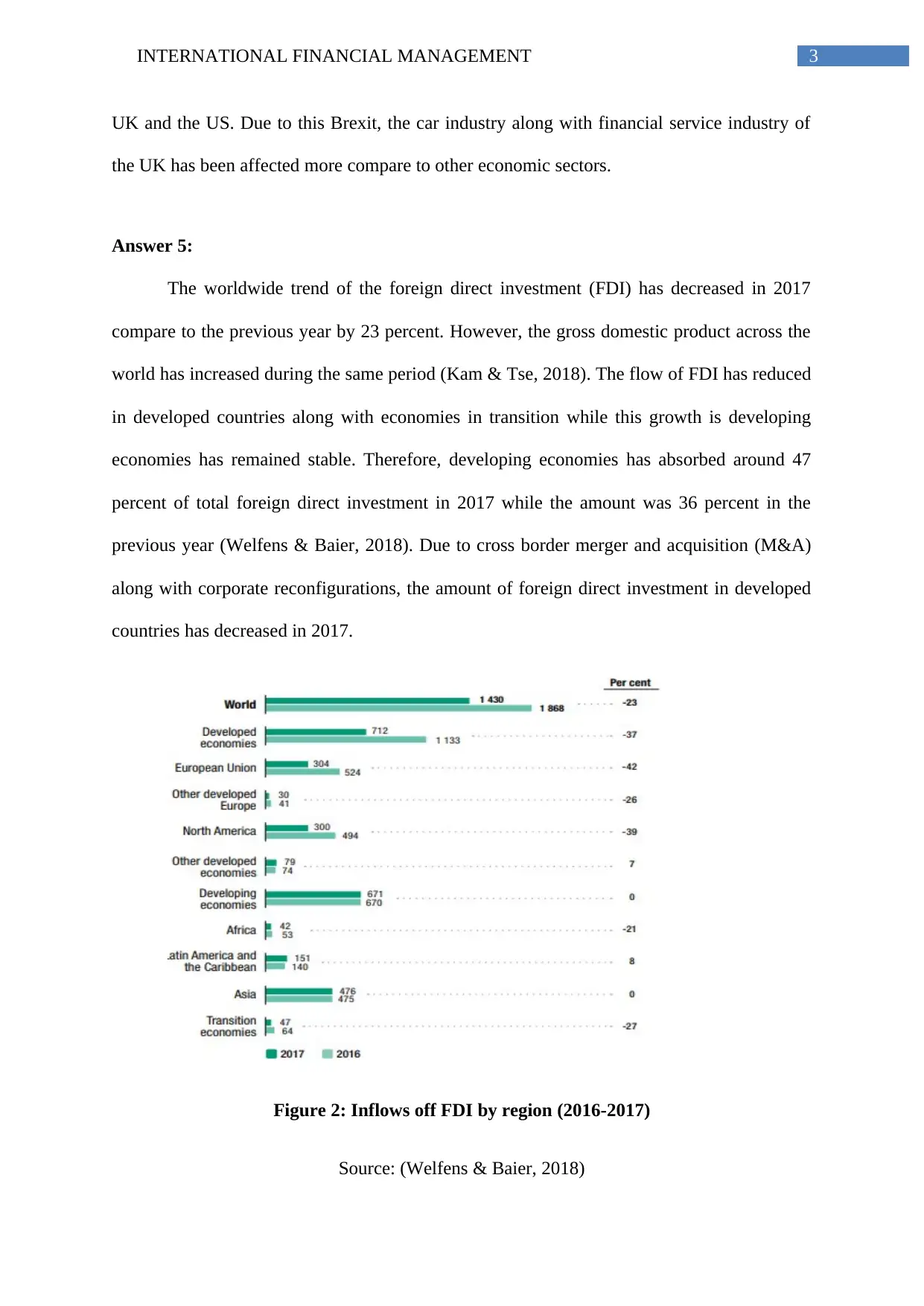
3INTERNATIONAL FINANCIAL MANAGEMENT
UK and the US. Due to this Brexit, the car industry along with financial service industry of
the UK has been affected more compare to other economic sectors.
Answer 5:
The worldwide trend of the foreign direct investment (FDI) has decreased in 2017
compare to the previous year by 23 percent. However, the gross domestic product across the
world has increased during the same period (Kam & Tse, 2018). The flow of FDI has reduced
in developed countries along with economies in transition while this growth is developing
economies has remained stable. Therefore, developing economies has absorbed around 47
percent of total foreign direct investment in 2017 while the amount was 36 percent in the
previous year (Welfens & Baier, 2018). Due to cross border merger and acquisition (M&A)
along with corporate reconfigurations, the amount of foreign direct investment in developed
countries has decreased in 2017.
Figure 2: Inflows off FDI by region (2016-2017)
Source: (Welfens & Baier, 2018)
UK and the US. Due to this Brexit, the car industry along with financial service industry of
the UK has been affected more compare to other economic sectors.
Answer 5:
The worldwide trend of the foreign direct investment (FDI) has decreased in 2017
compare to the previous year by 23 percent. However, the gross domestic product across the
world has increased during the same period (Kam & Tse, 2018). The flow of FDI has reduced
in developed countries along with economies in transition while this growth is developing
economies has remained stable. Therefore, developing economies has absorbed around 47
percent of total foreign direct investment in 2017 while the amount was 36 percent in the
previous year (Welfens & Baier, 2018). Due to cross border merger and acquisition (M&A)
along with corporate reconfigurations, the amount of foreign direct investment in developed
countries has decreased in 2017.
Figure 2: Inflows off FDI by region (2016-2017)
Source: (Welfens & Baier, 2018)
Paraphrase This Document
Need a fresh take? Get an instant paraphrase of this document with our AI Paraphraser
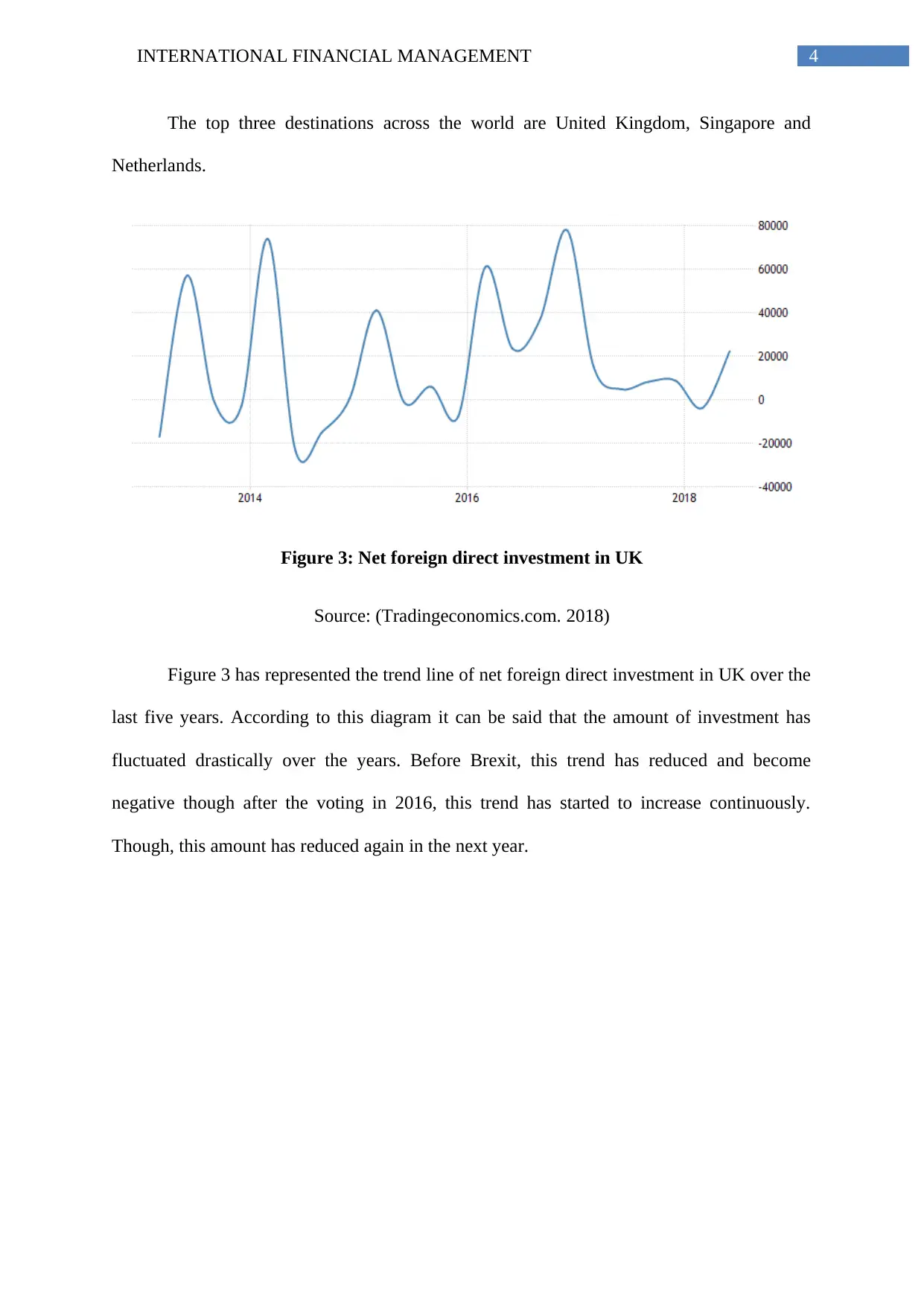
4INTERNATIONAL FINANCIAL MANAGEMENT
The top three destinations across the world are United Kingdom, Singapore and
Netherlands.
Figure 3: Net foreign direct investment in UK
Source: (Tradingeconomics.com. 2018)
Figure 3 has represented the trend line of net foreign direct investment in UK over the
last five years. According to this diagram it can be said that the amount of investment has
fluctuated drastically over the years. Before Brexit, this trend has reduced and become
negative though after the voting in 2016, this trend has started to increase continuously.
Though, this amount has reduced again in the next year.
The top three destinations across the world are United Kingdom, Singapore and
Netherlands.
Figure 3: Net foreign direct investment in UK
Source: (Tradingeconomics.com. 2018)
Figure 3 has represented the trend line of net foreign direct investment in UK over the
last five years. According to this diagram it can be said that the amount of investment has
fluctuated drastically over the years. Before Brexit, this trend has reduced and become
negative though after the voting in 2016, this trend has started to increase continuously.
Though, this amount has reduced again in the next year.
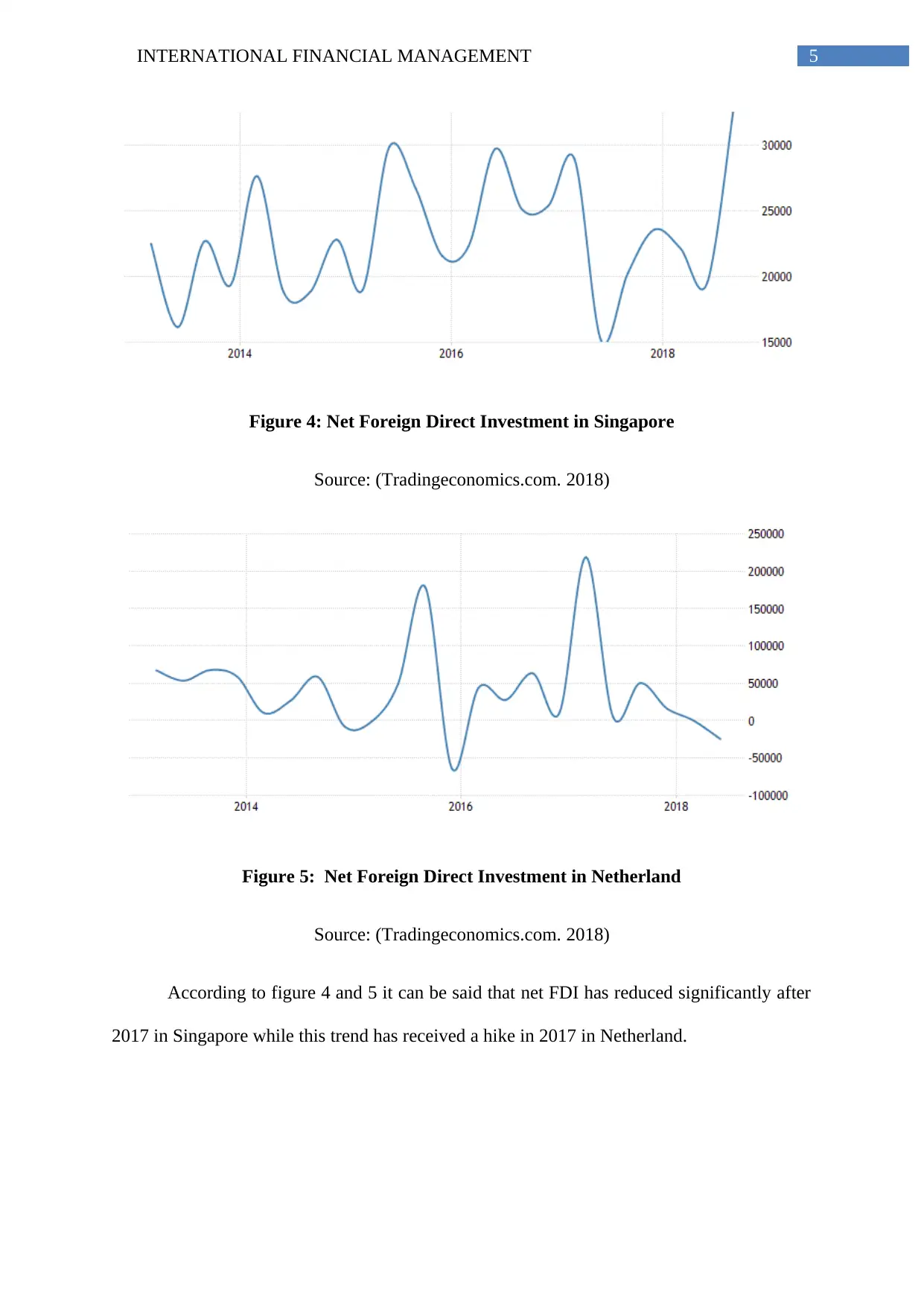
5INTERNATIONAL FINANCIAL MANAGEMENT
Figure 4: Net Foreign Direct Investment in Singapore
Source: (Tradingeconomics.com. 2018)
Figure 5: Net Foreign Direct Investment in Netherland
Source: (Tradingeconomics.com. 2018)
According to figure 4 and 5 it can be said that net FDI has reduced significantly after
2017 in Singapore while this trend has received a hike in 2017 in Netherland.
Figure 4: Net Foreign Direct Investment in Singapore
Source: (Tradingeconomics.com. 2018)
Figure 5: Net Foreign Direct Investment in Netherland
Source: (Tradingeconomics.com. 2018)
According to figure 4 and 5 it can be said that net FDI has reduced significantly after
2017 in Singapore while this trend has received a hike in 2017 in Netherland.
⊘ This is a preview!⊘
Do you want full access?
Subscribe today to unlock all pages.

Trusted by 1+ million students worldwide
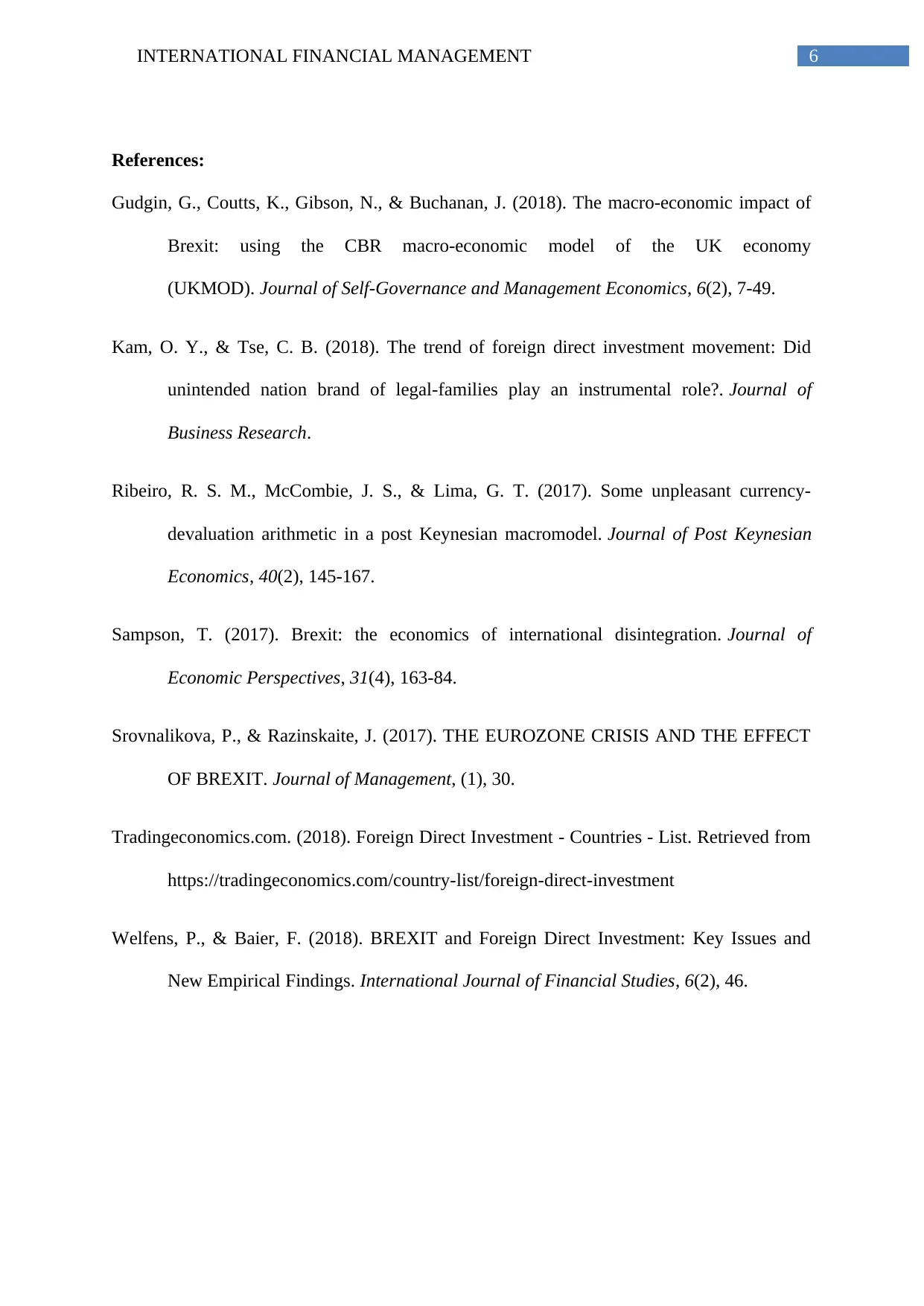
6INTERNATIONAL FINANCIAL MANAGEMENT
References:
Gudgin, G., Coutts, K., Gibson, N., & Buchanan, J. (2018). The macro-economic impact of
Brexit: using the CBR macro-economic model of the UK economy
(UKMOD). Journal of Self-Governance and Management Economics, 6(2), 7-49.
Kam, O. Y., & Tse, C. B. (2018). The trend of foreign direct investment movement: Did
unintended nation brand of legal-families play an instrumental role?. Journal of
Business Research.
Ribeiro, R. S. M., McCombie, J. S., & Lima, G. T. (2017). Some unpleasant currency-
devaluation arithmetic in a post Keynesian macromodel. Journal of Post Keynesian
Economics, 40(2), 145-167.
Sampson, T. (2017). Brexit: the economics of international disintegration. Journal of
Economic Perspectives, 31(4), 163-84.
Srovnalikova, P., & Razinskaite, J. (2017). THE EUROZONE CRISIS AND THE EFFECT
OF BREXIT. Journal of Management, (1), 30.
Tradingeconomics.com. (2018). Foreign Direct Investment - Countries - List. Retrieved from
https://tradingeconomics.com/country-list/foreign-direct-investment
Welfens, P., & Baier, F. (2018). BREXIT and Foreign Direct Investment: Key Issues and
New Empirical Findings. International Journal of Financial Studies, 6(2), 46.
References:
Gudgin, G., Coutts, K., Gibson, N., & Buchanan, J. (2018). The macro-economic impact of
Brexit: using the CBR macro-economic model of the UK economy
(UKMOD). Journal of Self-Governance and Management Economics, 6(2), 7-49.
Kam, O. Y., & Tse, C. B. (2018). The trend of foreign direct investment movement: Did
unintended nation brand of legal-families play an instrumental role?. Journal of
Business Research.
Ribeiro, R. S. M., McCombie, J. S., & Lima, G. T. (2017). Some unpleasant currency-
devaluation arithmetic in a post Keynesian macromodel. Journal of Post Keynesian
Economics, 40(2), 145-167.
Sampson, T. (2017). Brexit: the economics of international disintegration. Journal of
Economic Perspectives, 31(4), 163-84.
Srovnalikova, P., & Razinskaite, J. (2017). THE EUROZONE CRISIS AND THE EFFECT
OF BREXIT. Journal of Management, (1), 30.
Tradingeconomics.com. (2018). Foreign Direct Investment - Countries - List. Retrieved from
https://tradingeconomics.com/country-list/foreign-direct-investment
Welfens, P., & Baier, F. (2018). BREXIT and Foreign Direct Investment: Key Issues and
New Empirical Findings. International Journal of Financial Studies, 6(2), 46.
1 out of 7
Related Documents
Your All-in-One AI-Powered Toolkit for Academic Success.
+13062052269
info@desklib.com
Available 24*7 on WhatsApp / Email
![[object Object]](/_next/static/media/star-bottom.7253800d.svg)
Unlock your academic potential
Copyright © 2020–2026 A2Z Services. All Rights Reserved. Developed and managed by ZUCOL.





